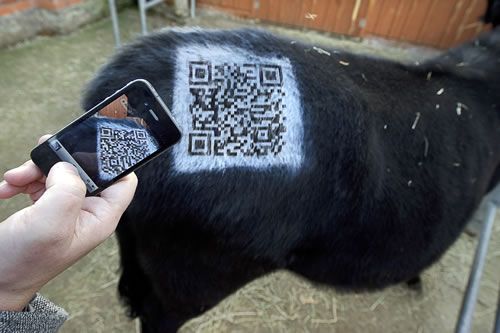QR cow

Farmers help develop pioneering smartphone "agri-apps"
T-Mobile runs brainstorm with 12 farmers, leading app developer, NFU and EBLEX to develop the ultimate smartphone app for farmers
Aim of the day to raise awareness of the benefits smartphone technology can bring small businesses owners, such as farmers
Innovative QR code cow idea put into practice on the day - QR code sprayed on a real cow
A dozen farmers, the National Farmers Union (NFU) and EBLEX attended a brainstorm recently to develop the ultimate smartphone app for farmers. The brainstorm was hosted by T-Mobile and facilitated by a leading app developer to come up with low-cost apps that would help those in the agriculture industry.
The brainstorm was hosted after T-Mobile spotted its business customers in the farming industry increasingly adopting smartphones. The aim of the day was to raise awareness of the benefits smartphone technology can bring small businesses owners, such as farmers. It also helped highlight to mobile app developers - and those supplying the agriculture industry - how farmers are ready to embrace mobile technology which helps improve productivity and efficiency. The best apps from the day will now be taken forward and pitched to agriculture technology businesses.
As part of the brainstorm, one idea was put into practice on the day. A real cow had a QR code sprayed on it. This code links to a webpage so farmers can check its provenance and vaccination history instantly using a smartphone.
Other smartphone agri-apps developed by farmers during the brainstorm – as detailed in T-Mobile’s Smartphone Apps for Farmers whitepaper - include:
1. Anti-rustling app – with sheep costing £1,000 each and pure breeds virtually irreplaceable, sheep and livestock rustling is a big problem for farmers. One farmer at the brainstorm recently lost 50 sheep at a cost of £50,000. This app, inspired by the 2008 film, The Dark Knight, links to a central camera located on a pole in the livestock field. The infrared camera identifies each animal by their heat signal. It sends push alerts to the farmer’s phone if the number of heat signals decreases. It also uploads this data to a central site, alerting other farmers in the area to potential rustling.
2. Real-time farm management app – using the smartphone’s GPS function, farmers can plot their land - they identify the area they want to calculate and physically go to each corner and take a GPS reading. From here, the farmer then calculates the approximate harvest size based on the choice of crops, which links to real-time index prices via 3G. The app would layer different information on their maps such as livestock in each field, track their movements and automatically upload this data to Defra to cut red tape (it currently has to be done manually).
3. QR code cow app – farmers can tag their cattle with chips to identify them. However, the scanning equipment costs £1,500 each. Instead, farmer would brand their cows with unique QR codes which, when scanned, would link people to the cow’s
personalised webpage which includes its age, inoculation history, breed, etc. Any free QR code scanner app would work with the code which reduces costs for farmers.
4. Disease management app – farmers take photos of arable crop diseases on their smartphones, the app then uses visual search to automatically identify the disease. The app matches disease identifiers such as specks on crop leaves to identify alternaria canker. Once the disease is identified, experts can provide live advice via a video link, removing the need for expensive callout fees.
5. Health and safety app – employees on the farm install this location-aware-app so when they use dangerous equipment, it lets them know if they are trained to use it. The app links to the individual employee’s health and safety records, which are stored in the cloud. In an emergency, the app can shut down the equipment and call the emergency services with voice control.
6. Flying sheepdog drone app – farmers will be able to supplement their sheepdogs with flying drones they control with smartphones. A video feed on the phone will allow farmers to see what the drone sees and control their flocks of sheepremotely.
Martin Stiven, Vice President of Business for T-Mobile, said: "With farmers being one of our most important customers, we were keen to find out how mobile technology could really supercharge their business. People frequently talk about small business owners being wedded to their smartphones but overlook that farmers are micro businesses in their own right, often adopting mobile technology well ahead of the field.
"According to research in America, 94% of farmers now own a smartphone. It’s a trend we’re starting to see amongst British farmers as they look at how mobile technology can cost effectively increase productivity and boost efficiencies."
Joseph Keating, Livestock Adviser at the National Farmers Union, said: "Farmers already work with a range of technologies on farm, from Global Positioning Systems to ensure inputs such as fertiliser are used efficiently on arable farms to using IT-based feeding systems for livestock.
"However, farmers will need to use even smarter technologies to help them meet the challenges ahead; producing more food and impacting less on the environment.
"It is exciting to see farmers involved in demonstrating the cutting edge of technology and what the future could hold."
Sessions such as these have led T-Mobile to develop the first mobile phone plan designed for micro businesses, like farmers. The plan features a free smartphone on a 12 month business mobile phone plan and ruggedised smartphone cases, protecting phones from the rigours of a farm environment.








